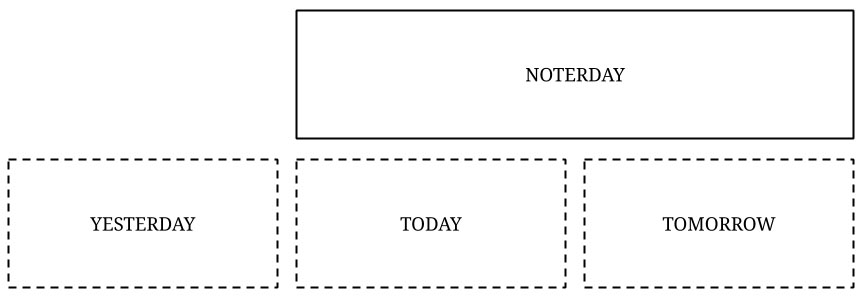“If your yesterday was much better than your today, then today you will most probably walk around in your yesterday.”
Mehmet Murat ildan, Turkish playwright and novelist.
I love playing with words. They’re living vessels of what it means to be human. Some words feel so natural we never stop to question their meaning. Take “yesterday”, which can be boringly defined as “the day before today”. It comes from Old English ġiestrandæġ (“of previous times” + “day”). But what if we ignored its etymology and gave this word a poetic spin instead? What if we rejected the “yes” in “yesterday”—what could “noterday” mean? In my imaginary dictionary, noterday means letting go of yesterday.

Bad memories stick better
“Don’t let the pain from yesterday ruin the new day that’s ahead of you,” said Charles Edward Hudson. If only we all applied that mantra. We’re instead very good at remembering what hurt us. Research suggests that bad memories are actually easier to remember, which may have evolved as an evolutionary tactic to protect ourselves against future negative events.
Negative emotions like anger, fear, or sadness trigger increased activity in a part of the brain linked to memories. These negative memories are preserved in greater detail than happy or neutral memories. “These benefits make sense within an evolutionary framework. It’s logical that attention would be focused on potentially threatening information” says Professor Elizabeth Kensinger of Boston College.
We’re amazingly talented at telling stories of how we were wronged last month, last year, even five years ago with the same anger than when it just happened. But scientists have found that holding on to past negative experiences produces continued unhappiness and can lead to depression. Instead, we should let go of grudges. Dr. Martin Seligman, director of the Positive Psychology Center at the University of Pennsylvania, explains that “letting go of grudges is a way to break grudge collecting.”
As Lewis Carroll famously said: “It’s no use going back to yesterday, because I was a different person then.” Saying no to yesterday means letting go of the past to enjoy the present and envision the time ahead. It takes commitment, it goes against our natural instincts, but it’s incredibly freeing to say no to the past and to not let it define our future.
The noterday exercise
If you’re ready to let go of yesterday so you can be present today and better work on tomorrow, here is a short exercise you can take to help you say no to the negative events in your past and the grudges you’re holding. Grab a notebook or a piece of paper, make sure to be in a quiet space where you won’t be interrupted, and answer these questions as honestly as you can.
- What is a negative memory you’re holding onto? Think about the specific details. What exactly happened, who was involved, when and where the event happened.
- How did you react at the time? List your emotions, your thoughts, and your actions, including the things you said.
- How do you feel today? Be honest with yourself. Do you still feel some of the emotions you felt at the time? Do you often think about this negative event?
- How do you want to feel? Be optimistic, but not overly ambitious. Would you like to feel more calm? Would you like to forgive? To reconnect?
- What steps will you take to bridge that gap? Think about how you can go from how you feel today to how you want to feel. Does it involve talking to the people involved? Going back to the place it happened? Journaling? Discussing the event with a friend? Another cathartic medium such as art or meditation? Keep it simple, but be specific.
The noterday exercise is not as much about blindly saying “no” to yesterday as it is about acknowledging the past to better let it go. It’s a healthy way to move on, which involves forgiving rather than forgetting. It’s hard to move towards your future when you carry too much from your past. The goal of this exercise is to drop the unnecessary weight of negative memories to clear your mind and focus your mental strength on what lies ahead.
